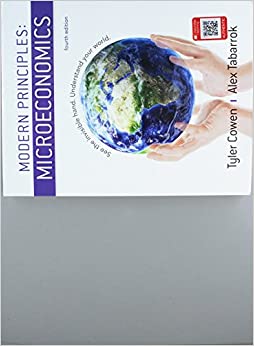Question
In Free to Choose, Milton Friedman makes the case that capitalism, i.e. free markets combined with governments that follow The Do Nothing Policy produce prosperity
InFree to Choose,Milton Friedman makes the case that capitalism, i.e. free markets combined with governments that follow The Do Nothing Policy produce prosperity and freedom. In lecture, production possibilities frontiers were used to show the mechanism by which capitalism produces wealth, i.e. specialization according to comparative advantage and exchange.
The history of the 20thcentury is replete with examples of countries that have followed just such a policy of free market capitalism and experienced large increases in total and per capita wealth plus created stable peaceful political societies characterized by respect for individual rights and maximizing personal freedom, e.g. Japan, Taiwan, Korea, Singapore, and, until the communist Chinese takeover, Hong Kong. In the 20thcentury, countries that were already prosperous and free that continued choosing capitalist systems became more prosperous, e.g. the United States, Western Europe, Canada, and Australia.
A key feature of free markets is a level playing field where the rules apply to everyone whether they are rich, poor, powerful, or connected. The level playing field is sometimes referred to as the Rule of Law (ROL).
The ROL according to the Oxford English Dictionary is"The authority and influence of law in society, esp. when viewed as a constraint on individual and institutional behaviour; (hence) the principle whereby all members of a society (including those in government) are considered equally subject to publicly disclosed legal codes and processes."
The ROL can break down in two ways. First, rulers and their entourage can be held above and not be subject to the law or, second, immunity from the law can be bought. In either case, the ROL does not exist or, alternatively, that society has a corruption problem.
A conundrum of the "capitalism produces prosperity and freedom" policy are countries that have capitalist economies but haven't produced much prosperity and are frequently but not exclusively characterized by bouts of politically based violence and oppressive abusive dictatorships, e.g. most middle eastern countries, most of South and Central America, Mexico, India, Russia, and until the last 20 years communist China.
InThe Mystery of Capital, Hernando DeSoto addresses this conundrum and points out that adopting capitalism is required but not sufficient to produce U.S. and western European levels of prosperity and freedom. DeSoto argues that adopting capitalism isn't enough. Countries have to choose a capitalist economic system, have ROL, plus dosomething else.
According to Hernando DeSoto, why are many 3rdworld countries not getting rich even though they have ostensibly capitalist free market economies?
What is the something else these countries are missing?
Read Chapter 7, "Deng Perfects Socialism" and Chapter 5 'The Shanghai Gang" in The Party by Richard MacGregor.
In what sense and to what degree does Communist China meet DeSoto's requirement for a capitalist economy that will use free markets to create and equitably distribute wealth.
Does Communist China have a capitalist free market economic system where there is ROL and no corruption?
Explain with examples fromThe Party.
Step by Step Solution
There are 3 Steps involved in it
Step: 1

Get Instant Access to Expert-Tailored Solutions
See step-by-step solutions with expert insights and AI powered tools for academic success
Step: 2

Step: 3

Ace Your Homework with AI
Get the answers you need in no time with our AI-driven, step-by-step assistance
Get Started


